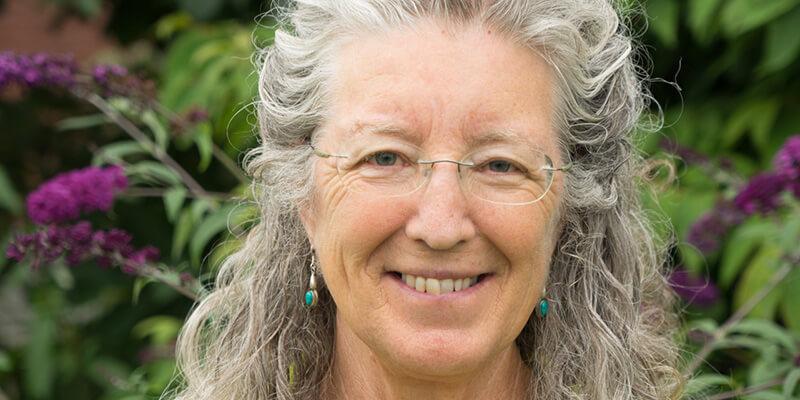Katharine “Kit” Anderson, Senior Lecturer in the Environmental Program in the Rubenstein School of Environment and Natural Resources is retiring from her role at the University of Vermont (UVM) this spring. A cultural geographer and ethnobotanist, Kit specializes in nature-society relationships, traditional storytelling, and exploring the cultural dimensions of human-plant interactions. She is known for incorporating both indigenous perspectives and social justice themes in her teaching in order to develop new ways of understanding and describing the world.
During her 20 years with the Environmental Program, Kit taught courses and mentored countless students in the Rubenstein School, the College of Arts and Sciences, and the College of Agriculture and Life Sciences.
Former student and recent graduate of the Environmental Program Claire Wiggin (‘16) remembers, “Kit recognizes the state of our world and political system and encourages students to see this as something that is connected, rather than separate, from the university. Kit serves as a real life model of scholar-activism.”
“Kit’s presence is truly felt throughout the Environmental Program,” shares Rick Paradis, UVM Natural Areas Center Director, and Lecturer in the Rubenstein School. “Her positive attitude, enthusiasm, and genuine interest in education inspired myself and other faculty within the program. Kit was an actively engaged faculty member, ready to roll up her sleeves and explore curricular changes and development.”
"Even though I’ve been here only a semester, I can clearly see Kit’s fingerprints on the Environmental Program," says Director Nate Sanders. "Her focus on facilitating interdisciplinary scholarship in our students and her high standards will continue to have a lasting impact on all of us."
Kit has advised numerous undergraduate students, and she also oversees the Environmental Studies undergraduate thesis capstone, guiding students as they learn research methods, write proposals, and complete their theses.
Claire Wiggin recalls an email Kit sent to her as she reviewed final edits to her undergraduate thesis, “The email said, ‘Remember, what you do is important.’” Claire goes on to share, “It is easy to feel unnoticed as one undergraduate student in a sea of many. Kit has an amazing capacity for supporting students in a manner that makes them feel known and encourages students to dive into studying topics that are meaningful and practical outside of a university setting.”
One of Kit’s most memorable student assignments at the University of Vermont asked students to create profiles of trees found on the UVM campus as part of her Tree and Culture course. Students each chose a tree species that was growing on campus, researched its cultural significance, and created a profile that they thought would appeal to other students. As a result, each profile reflects something about the student who prepared it. Known as UVM Trees, this work culminated in web-based tree profiles that examined the relationships between humans and trees from a number of diverse perspectives. Kit also served on the UVM Tree committee with other faculty and students.
Other favorite memories of teaching are from field experiences and service learning projects. Kit recalls, “Students totally engrossed in mapping community gardens in the Intervale, drawing native species at Colchester Bog, showing off a basket or atlatl completed after hours of work, giving a tour of trees on campus, and serving traditional foods at the Abenaki Heritage Garden.”
While teaching at UVM, Kit also actively carried out research and maintained a number of prestigious professional affiliations including the Society for Economic Botany, the International Society for Ethnobiology, and the National Association for Contemplative Mind in Higher Education.
In Vermont, Kit studied the history of herbalism and the exchange of knowledge about plants and their uses for food, medicine, and material objects in the early contact period when European colonists first arrived in the region and were interacting with Native Americans. Kit also traveled to Bhutan in June 2014 for the International Society for Ethnobiology meeting and chaired two sessions on storytelling with participants from Bhutan, Costa Rica, Uganda, and Kahzakstan. She also presented at the meeting about using storytelling to teach about traditional knowledge in an academic setting.
Kit has worked on trees in Louisiana and Guatemala and received her Ph.D. from Louisiana State University in the Department of Geography and Anthropology. Kit has a Master’s in Geography from the University of Vermont in 1979 and a B.A. in Botany from the University of Vermont in 1976.
“What I have enjoyed most about the Environmental Program is the genuine interdisciplinary focus, since that is how my own mind works,” Kit explains. “Being able to develop courses that bring together botany, geography, and anthropology has been a privilege. To me one of the most important things I teach about is the importance of cultural perspectives and worldviews. In traditional ecological knowledge, for example, we consider the difference between a world full of ‘natural resources’ and the indigenous view of a ‘community of beings’ that includes humans. How can we learn to include both in how we plan for the future?”
Kit’s future plans include spending more time on creative pursuits, especially playing the harp, storytelling, and writing about poeple and plants in Vermont, as well as going on some long distance walking adventures. She also looks forward to spending more time with her grandchildren and potentially teaching some field courses, like the Ethnobotany class offered this summer, or more informal community classes about people and plants. She is also considering volunteering at a National Park.
"My first career was as a gardening editor and director of a national non-profit and my second was in academia," says Kit who early on taught at Vermont's Johnson State College and former Trinity College, "and now I'm heading to a third career that has not yet been fully revealed."
